Related Research Articles

The gens Cornelia was one of the greatest patrician houses at ancient Rome. For more than seven hundred years, from the early decades of the Republic to the third century AD, the Cornelii produced more eminent statesmen and generals than any other gens. At least seventy-five consuls under the Republic were members of this family, beginning with Servius Cornelius Maluginensis in 485 BC. Together with the Aemilii, Claudii, Fabii, Manlii, and Valerii, the Cornelii were almost certainly numbered among the gentes maiores, the most important and powerful families of Rome, who for centuries dominated the Republican magistracies. All of the major branches of the Cornelian gens were patrician, but there were also plebeian Cornelii, at least some of whom were descended from freedmen.

Lucius Volusius Saturninus was a Roman senator from the powerful plebeian Volusia gens, or family. He held several offices in the emperor's service. Saturninus attracted the attention of his contemporaries for his long life: he died at the age of 93, and having sired a son at the age of 62.
Lucius Volusius Saturninus, also known as Lucius Volusius was a Roman Senator from the powerful plebeian Volusia gens, or family. He was a cousin of emperor Tiberius.
The gens Afrania was a plebeian family at Rome, which is first mentioned in the second century BC. The first member of this gens to achieve prominence was Gaius Afranius Stellio, who became praetor in 185 BC.

Titus Sextius Africanus was a Roman senator who was deterred by Agrippina the Younger from marrying Junia Silana. He served as a suffect consul in 59 AD. In 62 AD, he took the census in the provinces of Gaul, together with Quintus Volusius Saturninus and Marcus Trebellius Maximus. Saturninus and Africanus were rivals, and both hated Trebellius, who took advantage of their rivalry to get the better of them. Africanus is recorded attending meetings of the Fratres Arvales from 54 to 66. Titus Sextius Cornelius Africanus, who served as a consul with Trajan in 112 AD, was related to Africanus.

The gens Lollia was a plebeian family at Rome. Members of the gens do not appear at Rome until the last century of the Republic. The first of the family to obtain the consulship was Marcus Lollius, in 21 BC.
Marcus Lollius was a Roman Senator who was active in the second half of 1st century BC and first half of 1st century. He is best remembered as the father of empress Lollia Paulina.
Quintus Volusius also known as Quintus Volusius Saturninus was a senator of the Roman Republic who lived in the 1st century BC.
Lucius Volusius Saturninus was a senator of the early Roman Empire, who was active during the Principate. He was a member of the College of Pontiffs.
Lucius Volusius Saturninus was a Roman Senator who lived in the 1st century. He served as an ordinary consul in 87, as the colleague of the emperor Domitian. He is known entirely from inscriptions.
Quintus Volusius Saturninus was a Roman Senator who lived in the Roman Empire in the second half of the 1st century AD and the first half of the 2nd century. He was ordinary consul for the year 92 as the colleague of the Emperor Domitian, consul for the sixteenth time. He is primarily known through inscriptions.
Titus Sextius Magius Lateranus was a Roman Senator who lived during the second half of the 1st century and first half of the 2nd century. Lateranus served as a consul ordinarius in 94 as the colleague of Lucius Nonius Calpurnius Torquatus Asprenas. He is known entirely from inscriptions.
Volusia Cornelia, also known as Cornelia Volusia was a Roman woman of Patrician status who lived in the late 1st century. She was the daughter of the senator Quintus Volusius Saturninus, suffect consul in 92. She was born and raised in Rome. Her cognomen Cornelia, she inherited from paternal great-grandmother Cornelia Lentula, the daughter of the consul of 3 BC, Lucius Cornelius Lentulus from the gens Cornelia.
Licinia Cornelia Volusia Torquata also known as Cornelia Volusia Torquata Licinia was a noble Roman woman who lived in the Roman Empire in the second half of the 1st century and first half of the 2nd century.
Lucius Volusius Saturninus was a Suffect consul and Augur who lived in the Roman Empire in the second half of the 1st century and possibly in the first half of the 2nd century. He is known only through inscriptions. Saturninus was the grandson of Lucius Volusius Saturninus, consul in 87; the name of his father, which is nowhere attested, is thought to have been Lucius Volusius Torquatus.
Volusia Saturnina also known from her funeral inscription as Volusia Latina Saturnina was a Roman noble woman who lived in the Roman Empire in the second half of the 1st century BC and first half of the first century AD.
Lollia Saturnina (c.10-41) was a Roman noble woman who lived in the Roman Empire in the 1st century. She was the sister of the Roman empress Lollia Paulina and was a mistress of the Roman emperor Caligula.

The gens Sanquinia was a minor plebeian family at ancient Rome, which rose out of obscurity in imperial times to attain the highest offices of the Roman state. Members of this gens are first mentioned in the time of Augustus, and Quintus Sanquinius Maximus held the consulship under Tiberius and Caligula. The family vanishes from history in the time of Claudius.

The gens Sentia was a plebeian family at ancient Rome. Members of this gens are first mentioned in history toward the end of the Republic. The first of the Sentii to obtain the consulship was Gaius Sentius Saturninus, in 19 BC.
The Volusia gens was an ancient Roman family.
References
- ↑ As inferred from the fact his father was born in 38/37 BC, and sired Saturninus at the age of 63. (Pliny the Elder, Natural History, VII.62)
- ↑ Tacitus, Annales xiii.25
- ↑ Tacitus, Annales, iii.30
- ↑ Joyce Reynolds, "Roman Inscriptions 1966-1970", Journal of Roman Studies , 61 (1971), pp. 142-144
- ↑ Barbara Levick, Tiberius the Politician (London: Routledge, 1999), p. 53
- ↑ Boenzi, Giuliana et al. (1997). Terra di Fiano : ricerche di storia, arte, archeologia. Quasar p. 59
- ↑ Susan Treggiari, "Family Life Among the Staff of the Volusii", Transactions of the American Philological Association, 105 (1975), pp. 393-401
- ↑ Tacitus, Annales xiii. 19, xiv. 46
- ↑ Rickman, Roman Granaries and Store Buildings, p.169
- ↑ AE 1975, 175
- ↑ CIL VI, 2043
- ↑ CIL VI, 7297
- ↑ Rudolf Hanslik, "Saturninus (20)", Realencyclopädie der classischen Altertumswissenschaft , Supplement 9A, col. 1863
- ↑ CIL VI, 31726